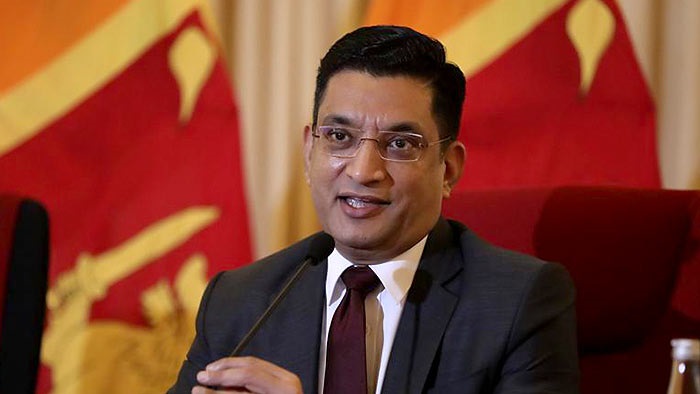
Former Minister of Foreign Affairs and Finance Ali Sabry has praised the National People’s Power (NPP) Government for staying on course with the International Monetary Fund (IMF) parameters in the Budget 2026.
Issuing a statement, former MP Ali Sabry said President Ranil Wickremesinghe’s administration took decisions that few would dare to take in the face of public anger, decisions that cost him the presidency but saved the nation from bankruptcy.
He pointed out that yesterday’s budget presented by President Anura Kumara Dissanayake is the continuation of the same path, determined to stay on course with IMF parameters.
“Yet, leadership is also measured in continuity, in the ability to recognize what must endure beyond political rivalry. And that is where President Anura Kumara Dissanayake deserves genuine credit. To continue these very same reforms, which his movement once fiercely opposed, is no small act of courage,” Sabry said.
The full statement of former minister Ali Sabry;
Economic recovery does not happen by accident. It is not a gift of chance or the outcome of a single leader’s charisma; it is built through consistency, sacrifice, and courage across time.
When Sri Lanka entered the IMF program in 2022, the nation stood on the edge of collapse.
The roadmap was demanding, even brutal:
- Reduce public debt from 119% to 95% of GDP by 2029,
- Cut Gross Financing Needs from 13.7% to 9%,
- Limit foreign debt service to 4.5% of GDP,
- Raise government revenue to 15% in the medium term, aiming for 18–20% in the long run,
- Maintain a primary surplus of 2.3% of GDP, and
- Reform loss-making State-Owned Enterprises through cost-reflective pricing.
By the end of 2023 and 2024, Sri Lanka had achieved most of these targets, not by magic, but by sheer political courage. The income tax bracket doubled from 18% to 36%, PAYE tax was reintroduced, VAT climbed from 8% to 15% and then 18%, and its threshold was halved to widen the tax net.
It was made mandatory to have TIN number to open a bank account, buy a vehicle and purchase property, thus expanding the tax net.
Fuel, electricity, gas, and water were priced to reflect their true cost, despite social resistance. These measures restored confidence, reopened IMF flows, and rebuilt credibility in international markets, but they came at a heavy political price.
President Ranil Wickremesinghe’s administration bore that burden. He took decisions that few would dare to take in the face of public anger, decisions that cost him the presidency but saved the nation from bankruptcy.
Yesterday’s Budget presented by President AKD is the continuation of the same path, determined to stay on course with IMF parameters.
Yet, leadership is also measured in continuity, in the ability to recognize what must endure beyond political rivalry. And that is where President Anura Kumara Dissanayake deserves genuine credit. To continue these very same reforms, which his movement once fiercely opposed, is no small act of courage.
Payee remains, VAT 18% remains, elevated Income Tax slabs remain, and the VAT threshold is reduced further. Cost reflective pricing continues, and people still pay Rs. 100 as tax per litre of fuel to pay for the past losses. All sensible, necessary, yet unpopular decisions were made when they were taken.
It takes immense courage and a touch of irony to desert ideology and embrace pragmatism. To move from fiery opposition to fiscal orthodoxy, from railing against taxation to defending it, is a transformation not often seen in politics. One must almost admire the conversion, for while it may lack romance, it redeems itself in responsibility. And for that, the President and his government deserve due credit.
By choosing pragmatism over populism, President Dissanayake has shown that he values the country’s future above political comfort. His government’s decision to stay the course, maintaining fiscal discipline, sustaining SOE reforms, and resisting the populist temptation to reverse hard-earned stability despite the election promises to do so is commendable.
Sri Lanka’s progress today is the outcome of continuity, not a miracle. The least we owe the truth is to tell it as it is, without rewriting history to suit the day’s applause.
The rising tax revenues, renewed investor confidence, and reopening of vehicle imports are not isolated victories of one regime or another. They are the cumulative result of continuity, of two administrations separated by politics but united by necessity.
So, by all means, let’s celebrate stability, but let’s not forget who swallowed the bitter pill so that the next could taste recovery. The numbers remember, even if politics forgets.
Sri Lanka is, once again, learning the timeless truth of nation-building: that progress has no ideology. It only rewards those willing to do the right thing, whether or not it wins them applause.
In my case and in the case of the majority of the Sri Lankans, it doesn’t matter who governs as long as it is in the interest of the nation. (Newswire)
